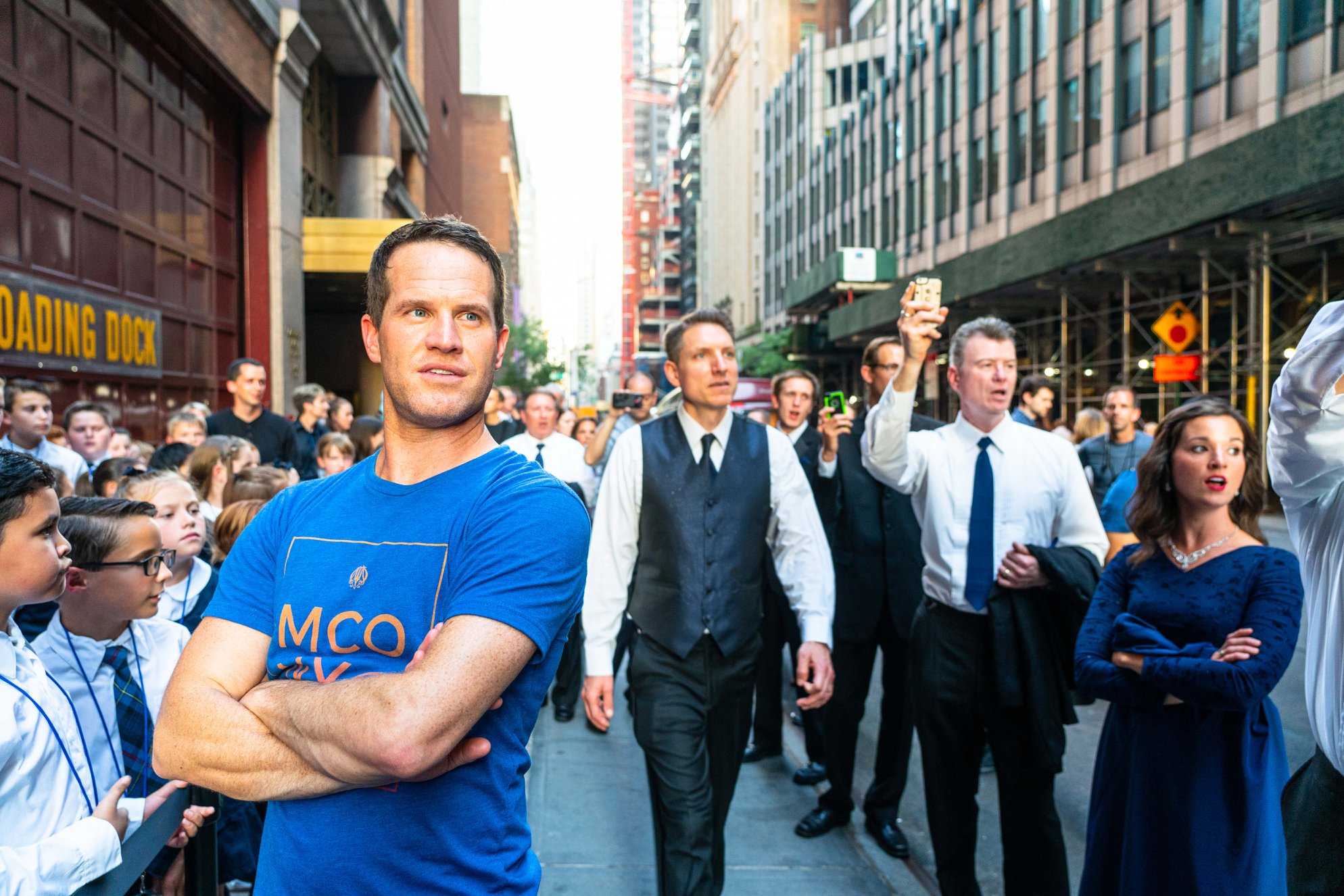by Brett Stewart, Founding Dean & Musical Director
ALL A BAD DREAM
As I lay on the bed in my dark, musty, upper-floor hotel room, staring up at the ceiling in disbelief at what had just occurred, hoping it was all a bad dream, the lights and air suddenly came on. I looked at my phone. 11:00 PM. Just 90 minutes past the deadline that Carnegie Hall staff initially said they would still allow us to hold a concert were the power to come back on. But the 9:30 PM deadline had come and gone, and by now the crowds outside Carnegie had long-since dissipated. My heart sank for about the 100th time that evening. Besides, having stayed at Carnegie until past 10:00 PM with MCO’s other conductors and leadership and the Carnegie staff, trying to find a way to reschedule the concert for the following day, it became increasingly evident that this was a more widespread problem than any of us realized. The Carnegie staff eventually received word from their superiors that even if power were restored that night, it would take more than 24 hours to get systems up and running again and gain proper approval from the city to hold an event with thousands of people. We left powerless and helpless, and all I wanted to do is go back to my dark, musty, upper-floor hotel room and stare at the ceiling in disbelief, hoping it was all a bad dream.
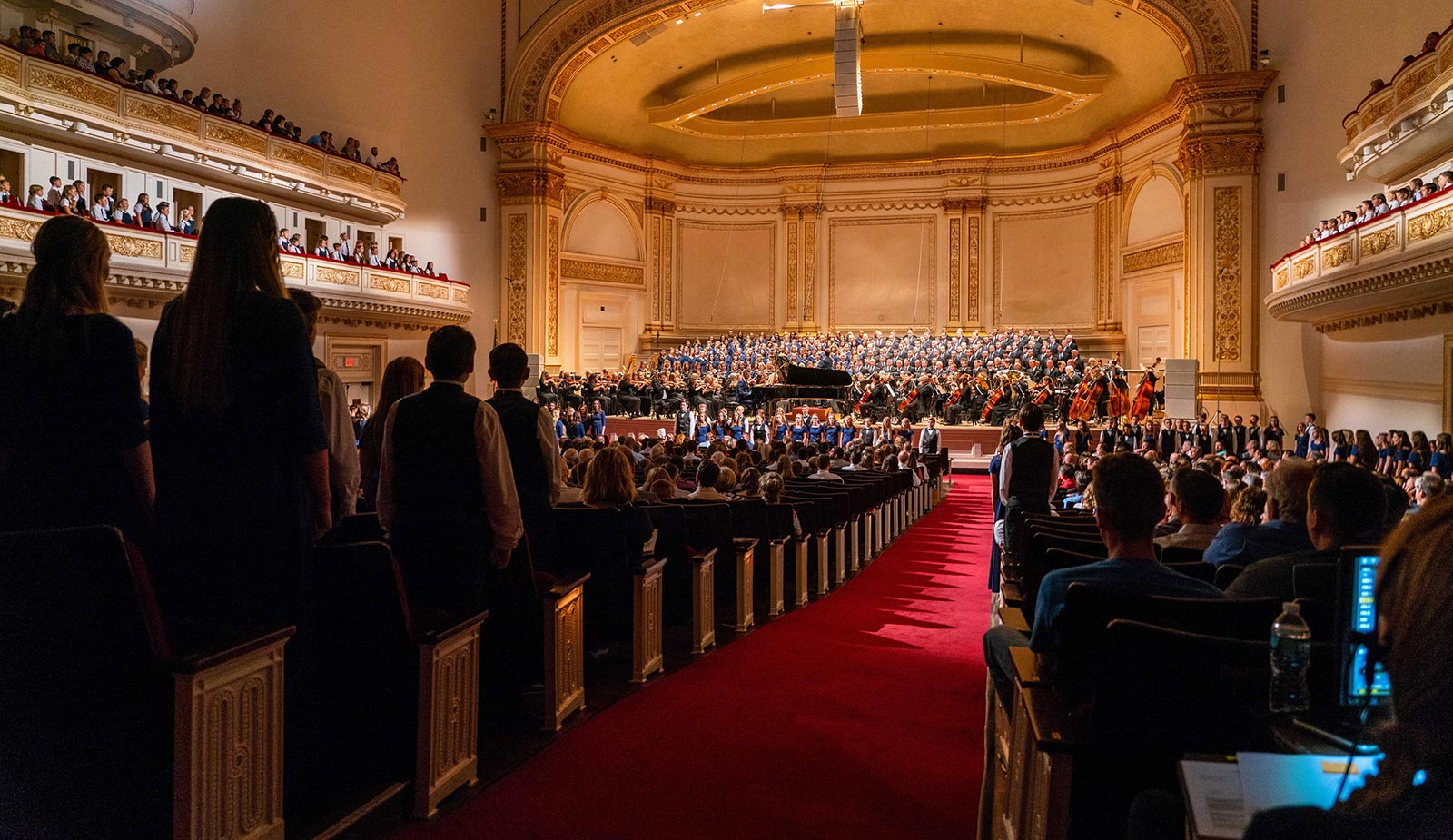
CUT OFF WITH ME!
After two amazingly successful concerts (literally, without a single hiccup!) in Carnegie on Friday evening, July 12, and Saturday afternoon, July 13, performed by the Texas, Idaho, and Arizona locales, we were rehearsing with the California and Utah locales on Saturday evening in preparation for their concert that night. I was the conductor on the podium at the moment of the blackout. We were in the middle of rehearsing “A Mighty Fortress” with the entire cast in the hall (except the Young Singers Chorus). When the hall suddenly went dark, we were singing these remarkably significant words:
God’s Word forever shall abide, no thanks to foes, who fear it;
For God Himself fights by our side, with weapons of the Sprit.
Though goods and kindred may go, all taken by our foes,
Though life be wrenched away, they cannot win the day.
His Kingdom is forever!
We went right on rehearsing, assuming it was a Carnegie issue and that they’d have the lights back up soon. Besides, the orchestra’s stand lights were battery-operated, so they could still see their music. As for the choir, I chuckled to myself, “This is why we make you memorize your music!” On the final cut-off of the song there were some singers who held the final note too long, and I said, “Let’s do that ending again and WATCH me!” Because of the uniqueness of the situation (rehearsing in the pitch black), a participant started video-recording the scene (against Carnegie rules!). In the video (which shows the faint silhouettes of the participants and conductor on stage), you can hear me holler above the music, right before the final cutoff, “CUT OFF WITH ME!!” It’s comical now—how would ANYONE be able to cut off with me when they can’t see their hand in front of their face? But as is come to be expected of MCO participants, they used their resources to get the job done, listened more intently, and cut off exactly together, even in the dark. And then I said something like, “Good. Much better,” as if the unison cutoff of over 1000 performers was somehow more pressing than the fact that we had had no power for the past five minutes. The show must go on, right?!
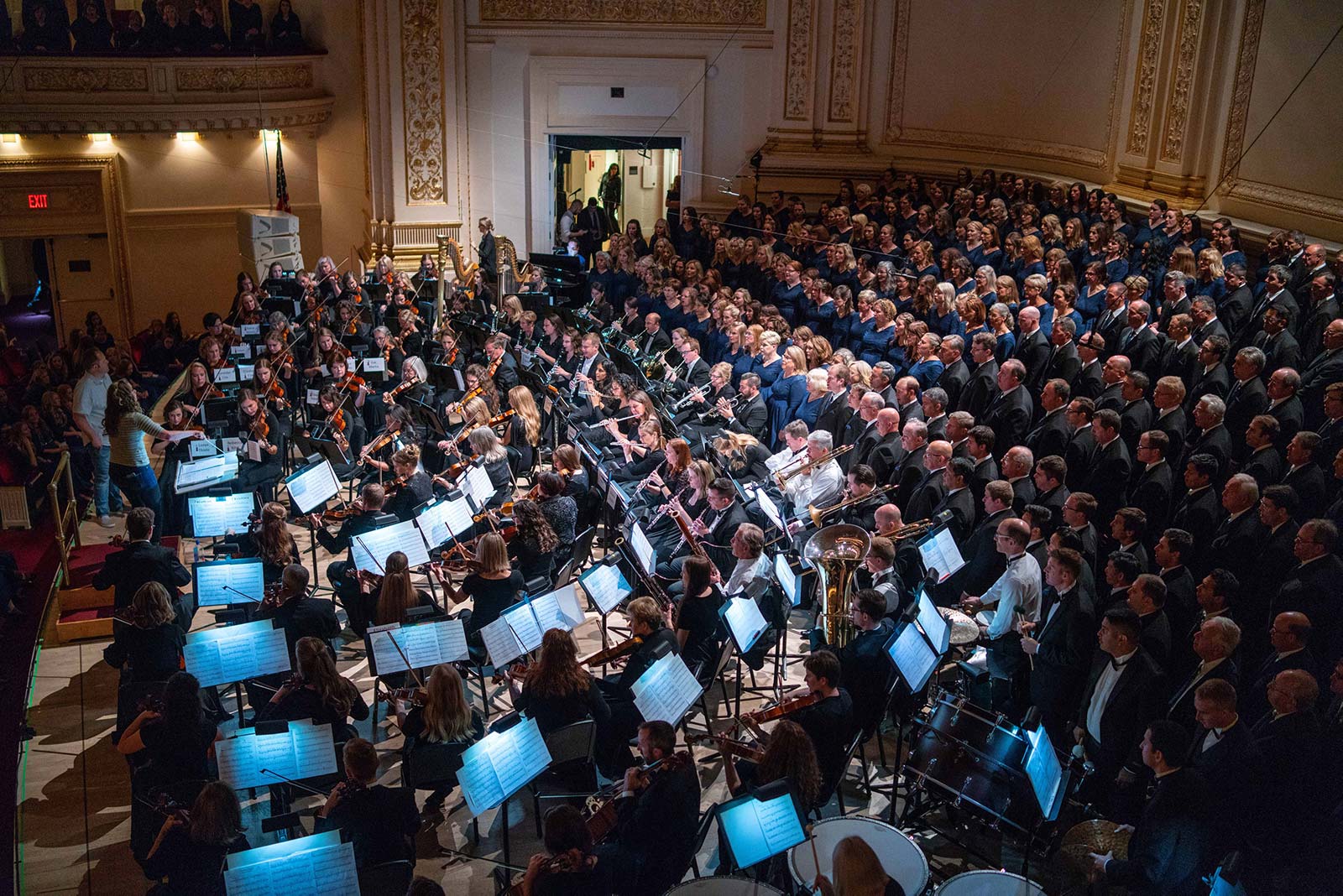
Eventually backup power from Carnegie’s generator came on and we had some dim lights, but we were informed that would only last twenty minutes or so. The Carnegie staff asked us to stop rehearsing, and we all sat there and watched as conflicting messages came to the stage. “You need to exit this hall immediately and go out into the streets,” came one demand from front of house staff. “No, wait. We’re still talking about the right course of action—just wait,” came direction from backstage staff. This went on for maybe 20 minutes. “Can we just rehearse while we wait?” I asked the house manager. “No, we’re going to evacuate you. Just wait.” All the while, we were receiving texts from friends and family outside the hall saying the power outage was widespread, from Times Square all the way to Central Park, including the Broadway shows and one of the major airports.
It came to a head between front-of-house and backstage staff trying to figure out the right course of action, until finally someone came to the stage frantically and said, “Everyone needs to evacuate the building now!” I was still at the conductor’s podium with other conductors standing close by, and without giving it any thought beforehand, something caused these words to be blurted from my mouth, loudly: “Stop! We’re not going anywhere until we’ve prayed. Brandon, please pray.” The chaos halted—even the Carnegie staff stood still, taken back by my request. But without skipping a beat Brandon offered a beautiful prayer calling upon the heavens to give us power and light. It wasn’t until the next day that we would begin to realize what form of power and light the Lord would provide.
After the prayer I mentioned to everyone in that hall that I believe MCO participants are some of the most faith-filled people in the world, and that if anyone could make this happen, they could, and that I expected every one of them to keep up the praying until we had power again. I personally believe the rock-solid faith of those 1000+ youth and adults is what opened the heavens that evening. It is what made MCO participants and leadership spring into action to make the impromptu street concert happen. It beckoned the masses to 56th Street to hear us sing. It opened the wireless conduits and put the right people in the right place at precisely the right time to spread our music and story to millions.
MIRACLE ON 56th STREET
We evacuated the hall onto 56th Street in as orderly a fashion as we could with 1,100 participants. I was in a sort of daze, to be honest. I wandered outside into the street and just watched in awe as things unfolded. MCO’s staff kicked into high gear to figure out where everyone would go and how we would keep everyone safe, and all without having any idea what to expect next. Parent volunteers were feverishly gathering children to safe spaces. It was intense, but most everyone remained calm and followed the myriad of orders that were shouted out at them.
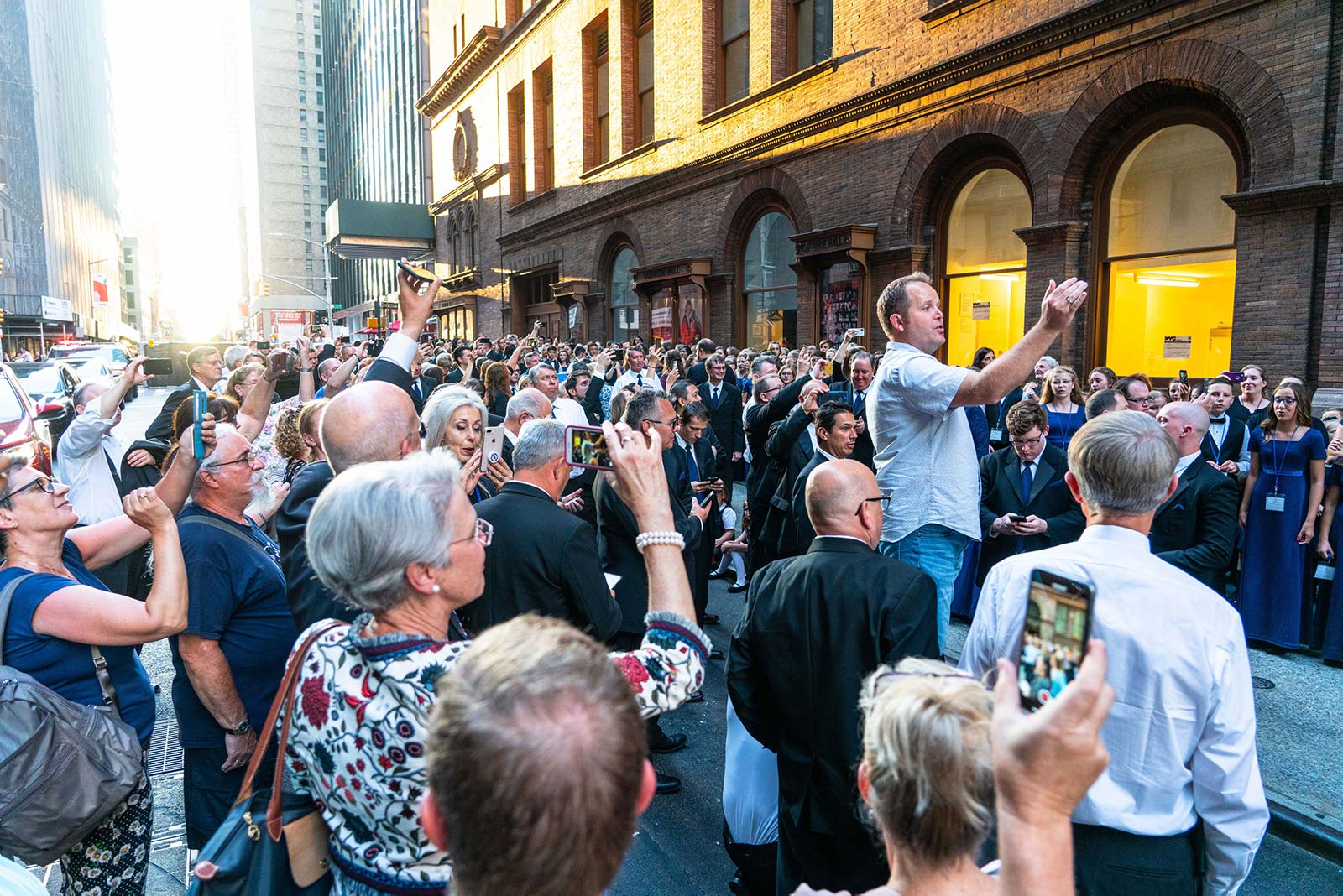
Then I heard a group singing down the street a ways and realized it was a gathering of Grand Chorus singers with one of the participants leading them. Then another group was singing somewhere else. Pretty soon Professor Mendenhall was up on a chair in the center of the action and leading whomever would join in “God Bless America” and other favorites. Even the orchestra musicians, some with instruments in hand, joined in the singing. I was still in a daze until I noticed crowds coming toward us. Some were familiar faces of MCO family, but it was when I noticed a bystander wearing cut-off jean shorts and holding a beer in her hand, with her head looking up toward heaven as we sang, that I finally realized what was happening. This WAS our concert, only it would be in the streets of NYC rather than in Carnegie. We started one of the songs the kids sing, “To Be American,” and one of the conductors yelled, “Brett, go lead the children.” As I walked toward them, standing against the outer wall of Carnegie, they were fixated on me. They were intent. They took this street concert seriously. I got emotional for the first time that evening.
Eventually the bulk of the cast was gathered together and we sang several more songs from our concert. But the one that touched me most was Mack Wilberg’s “I Believe in Christ.” After it was all said and done, well into the early Sunday morning hours, friends and family (who know I have zero presence on social media and don’t even know how to use it) were texting me with the updates on MCO’s impromptu street concert going viral. One video in particular, and not even the best quality one, was viewed the most, trickling up to nearly 5 million views in 24 hours. And it was that video that captured “I Believe in Christ.” That was the message and the moment that millions got to experience and associate with MCO—and how perfectly fitting were those words, as they articulate exactly what we believe as an organization and what we preach through our music: “… And while I strive through grief and pain, His voice is heard: ‘Ye shall obtain.’ I believe in Christ; so come what may, with Him I’ll stand in that great day …”
Throughout that following Sabbath day, as millions heard the candid sound clips, I mused in awe at a fact that few people knew: “I Believe in Christ” was not even supposed to be a part of the Carnegie concert. After the entire program was already decided upon, I received a phone call from my brother Brandon, who had just come back from meeting with Carnegie staff. He told me that as he stood there in the hall he had the distinct impression that the Carnegie audience needed to hear Mack Wilberg’s arrangement of “I Believe in Christ.” I remember his words, “You know I don’t get these strong impressions that often, so, take it or leave it.” And my answer was, “I’m not one to disregard the Spirit. We’re doing it.” I have often said of serendipitous situations, “This is quite a coincidence to be just a coincidence.” I do believe in coincidence. But I also believe in divine intervention, and there is no question that the inspiration to include this song on the program was so that it would be heard by millions in a way none of us could have possibly foreseen.
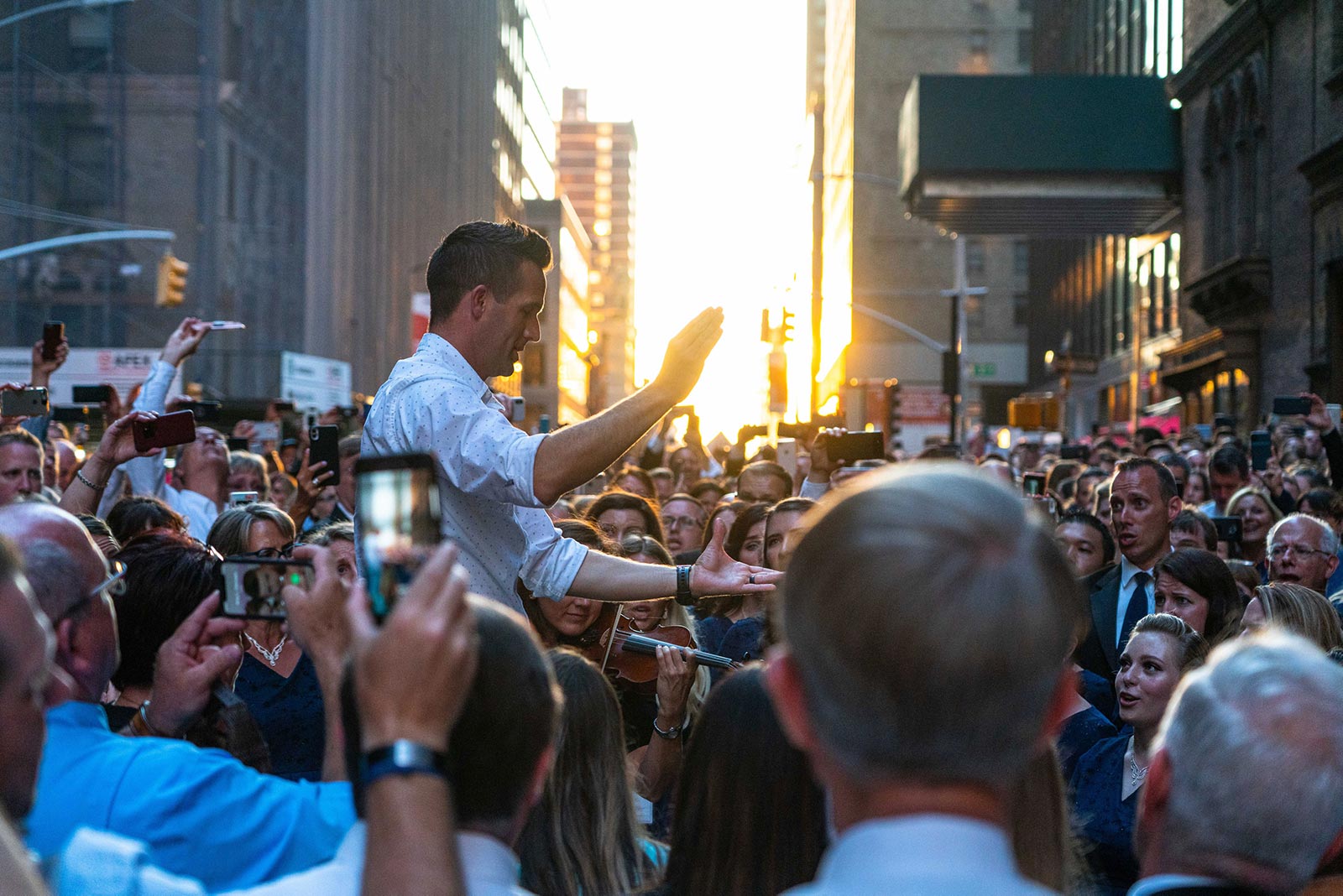
THE AFTERMATH
Sunday evening, just 24 hours after the blackout, I began to calculate the estimated amount of personal loss of our combined Utah and California participants from that blackout: 1,100 participants traveling, mostly by plane, staying in expensive NYC lodging for several nights, with overpriced food, ground transportation, etc. When the numbers reached one million dollars, I put my phone down. I was sick. And I didn’t even consider in my calculations the losses due to fathers and mothers and youth taking off work to participate in the tour. Then I thought of the family reunions and other trips that were postponed or rescheduled, the missions that were postponed, the weddings that were postponed, and even those who missed family weddings. I thought of the stories of youth who spent their life savings or worked two jobs just to be able to participate in this tour. I thought of parents who cut other activities and vacations this year, gave this to their children as a Christmas present, or worked extra jobs themselves to afford the trip.
These sacrifices weighed heavily upon me until the reactions of these amazing participants from Utah and California began to trickle in, laden with positivity and silver linings. As one social media user put it, they “turned lemons into lemonade.” I was greatly humbled that while I was wallowing in sorrow for these people, they were finding joy in the experience they had. One participant summed up the entire adventure with perfect perspective: “We came to New York City to sing in Carnegie for thousands, and instead we sang outside of Carnegie for millions. I’d say our mission was more than accomplished!” And of course the entirety of MCO—who have become a family of thousands—recognizes and appreciates that this all came at a great sacrifice for the California and Utah participants. But while literally tens of thousands of choirs and orchestras have performed in Carnegie throughout its history, MCO’s California and Utah locales are the only ones that will be known as the heavenly choir that sang for millions on the streets of NYC during its historic blackout. More importantly, they will be remembered in the MCO history books for their remarkably positive attitudes and outlook—a core value of MCO.
My church has a set of thirteen articles of faith that outline the core beliefs of its members. The final article says, “We believe in being honest, true, chaste, benevolent, virtuous, and in doing good to all men; indeed, we may say that we follow the admonition of Paul [Philippians 4:8]…. If there is anything virtuous, lovely, or of good report or praiseworthy, we seek after these things.“ Our little “Miracle on 56th Street” was the first time I had the realization that this admonition is not just for a select group of God’s children. With the light of Christ in all of us, we all inherently seek after good. That is why crowds from all walks of life gathered, recorded, and shared our street concert, calling it “angelic” and “a piece of heaven on earth.” That is why civilians (and MCO participants) took it upon themselves to direct traffic to keep the crowds on the streets safe. That is why the owner and employees of the restaurant on the corner noticed our youngest MCO children standing in the heat and brought out water and glass cups. It is the reason they took it upon themselves to form a human shield to protect those children from the oncoming traffic.
As these events and hundreds of others silently took place, God cleared the polluted skies of New York City and allowed us to enjoy the beautiful sunset in an event we later learned was called Manhattenhenge—one that only occurs a few days out of the year. I am convinced the Lord was shining His light right down 56th Street—not only to prolong our street concert but to show His approval for something virtuous, lovely, of good report, and praiseworthy. God’s children showed inherent light that day, and being a small part of that was worth all of the effort it took to get there and the disappointment of temporary darkness.
